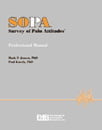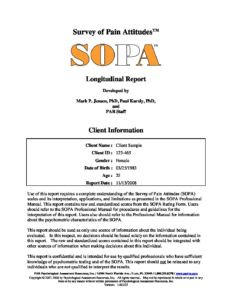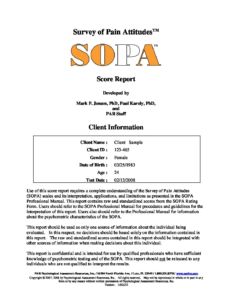
Survey of Pain Attitudes sopa
For: Assess patients' attitudes and beliefs about pain
Reading Level: Adult, Elder Adult
Format: Paper-and-Pencil
Length: 10-15 Minutes
Scoring: Hand Scored
Online Forms, Reports, Kits & e-Manuals
All online resources including Forms, Reports, i-Admins, Kits and e-Manuals.
Printed Kits
Click to browse products
SOPA online Longitudinal Score Report (each) min order 5
SOPA online Score Report (each) min order 5
SOPA online i-Admin (each) min order 5
SOPA Introductory Kit
Author
Mark P. Jensen, PhD and Paul Karoly, PhD
Description
Research conducted over the past decade indicates that patients’ attitudes and beliefs about pain play a key role in their adjustment and treatment outcome. The SOPA was designed to assist clinicians in the understanding of seven key pain-related beliefs of patients who have chronic pain with the assumption that these beliefs reflect and influence patient functioning. It is a self-report instrument that individuals are asked to indicate their level of agreement with 57 statements using a 5-point Likert scale. This newly standardised version of the SOPA was normed using a sample of 415 patients with chronic pain. The SOPA was designed to assist numerous health care providers working with adults ages 21-80 years.
The SOPA may be used in a variety of testing situations, including pre-treatment screening to determine treatment necessity, pre-treatment and post-treatment to determine treatment effectiveness, and periodic re-evaluations to document treatment progress.
The SOPA consists of seven scales that are divided into two domains -the Adaptive Beliefs Domain and the Maladaptive Beliefs Domain.
Adaptive Beliefs Domain
Control Scale -Assesses the extent to which a patient sees themselves as having control over their pain.
Emotion Scale -Assesses the patient’s belief that emotions have an impact on pain.
Maladaptive Beliefs Domain
Disability Scale -Assesses the extent to which a patient believes that they are disabled by pain.
Harm Scale -Assesses a patient’s beliefs that pain is a sign of physical damage and that in the presence of pain, exercise/activity should be avoided.
Medication Scale -Assesses a patient’s belief that medications are an appropriate treatment for their pain problem.
Solicitude Scale -Assesses the extent to which a patient believes that others (e.g., family) should be helpful/solicitous in response to their pain (e.g., taking over chores).
Medical Cure Scale -Assesses the extent to which a patient believes that a cure will be found for their pain and that the primary responsibility for the management of their pain rests with the physician.
Features
T scores and percentiles are included for calculating scores; a validity scale (i.e. Inconsistency Score) is included to measure inconsistency of responses.
Reliable Change scores are included to assist in determining if there are differences between scores obtained on two different testing occasions (e.g. pre-treatment vs. post-treatment).
Interpretive guidelines and case examples are included.
Profile Form includes a skyline for clinically elevated scores and treatment goals.
Reliability and Validity
Internal consistency for the seven SOPA scales ranges from .65 to .82 for the standardisation sample.
Test-retest stability for the SOPA scales is moderate to good, ranging from .67 to .79 (n = 130).
The validity of the SOPA is discussed in terms of evidence based on intercorrelations among the SOPA scales, correlational analyses examining the relationships between the SOPA scores and scores on related measures (i.e. mental health/psychological functioning, physical dysfunction/disability, medical utilisation) and the use of the SOPA as a measure of treatment outcome.
NB: Prices are in Australian dollars inclusive of GST. NZ customers need to log in to view ex-GST prices.
 NZ
NZ






